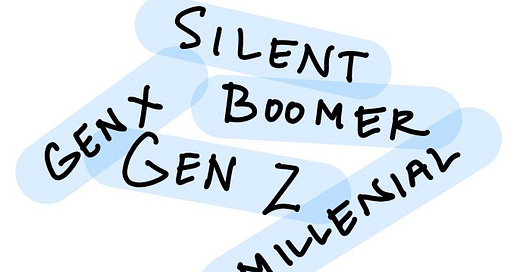Generations, revisited
Happy new year! As Discovery Session glides into 2025, it is with new questions about “generations” in the workplace. In the last post about “Multi-generational workplace challenges” we considered how workshops might build bridges among workers from different “generations,” like Baby Boomer, Gen Z, or Millennial.
The debate over “generational” labels!
Since then I’ve come across a lively debate about whether we should be using these “generational” labels at all, with various for/against arguments. Should we worry about these labels inflaming bias and discrimination, or should we leverage them for better conversations? Does highlighting the topic create more separation among generations or offer ways to build a shared way of working?
The labels’ originator, the Pew Research Centre, has been challenged on the labels and now suggests that we “bring a healthy dose of skepticism to the generational discussions” we see—the labels are “general reference points rather than scientific facts.” It has introduced a new policy for generational analysis, in which it will not compare the “generations” but compare people of the same age at different periods: for example, life for a 25 year old in 1980, 2000 and 2020, for example. This should illuminate how behavior may be the same or different in different periods.
So, what of “workshopping” multi-generational workplace challenges?
After looking into the debates, I’m convinced that research on generations needs the kind of scrutiny Pew is suggesting. But I’m also swayed by some Linkedin research (mentioned previously):
managers themselves are reporting that they are challenged by teams made up of people born and defined in different social and economic contexts that shaped their careers. Handling a multi-generational workforce is one of a number of changes that are combining to overwhelm professionals.
The youngest generation of workers (especially some of those getting started during and shortly after the pandemic) and the oldest generation of workers are not communicating too well.
However you label it, there seems to be a real challenge. Exploring differences (e.g. communication styles, workplace etiquette, preferences for technology) may build toward a work environment where everyone feels confident in a mixed-age team. As people live longer and stay in the workforce longer, it seems like this kind of good practice will continue to be valuable.
If you decide to workshop multigenerational challenges, it may help to anchor the session in the organization’s own values and goals. On the other hand, you could go for generic team building and run the kinds of exercises mentioned in the previous post without reference to age or generation, but be prepared to have an approach for it, if it comes up.
Where do you come down on this debate?
If you’ve experienced struggles between generational ways of working, would you consider running workshops that call them out ? What would be your concerns about it?




